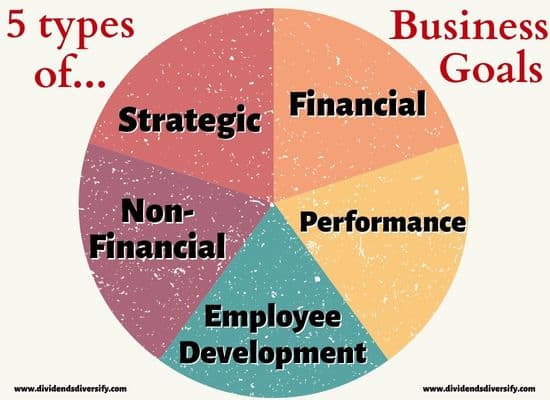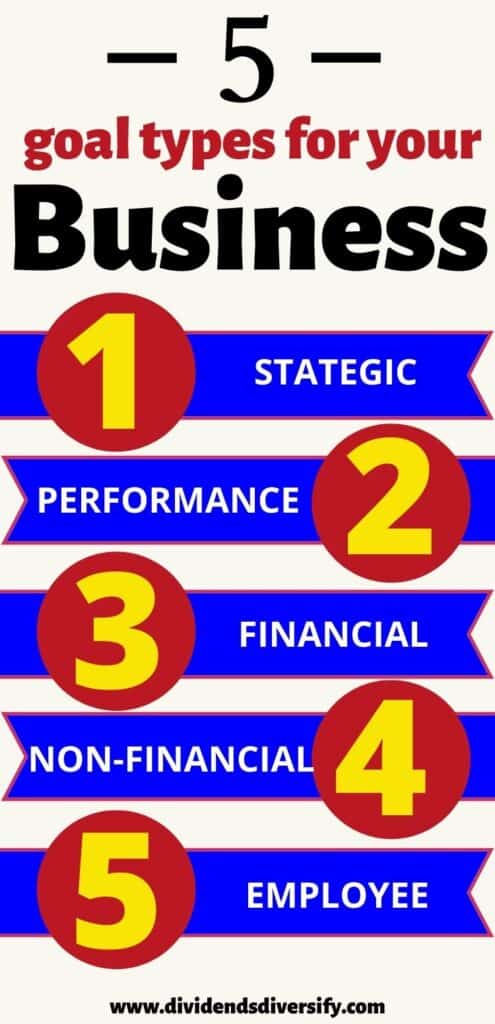Common Business Goals Fall Into These Main Categories
The most successful businesses I have worked in understand the 5 types of business goals. Then use that understanding to benefit the organization’s performance.
Thus, our objective for today is to review these categories of business goals. Then you can get to work. And take your company to the next level.
Time is money. So, let’s get moving…
Types Of Business Goals
Common business goals for small businesses and large fall into one of these 5 categories:
- Strategic
- Performance-based
- Financial
- Non-financial
- Employee development
Next, I would like to expand on each of these different types of goals…

Disclosure: At no cost to you, I may get commissions for purchases made through links in this post.
1. Strategic Business Goals
Every company has a strategy. Including yours.
Whether you have consciously crafted that strategy. Or, just let evolve without paying attention.
Furthermore, your company’s strategy likely emphasizes one of three things…
Cost Leadership
First, your company may choose a low-cost leadership strategy. Allowing for the most competitive pricing in the marketplace. While still making a good profit.
In the retail space. Walmart is a good example.
Innovation and Differentiation
Second, your company may strive to be innovative. And differentiate itself from the competition.
This can be either through delivering a superior customer experience. Or, by continually bringing new products and services to market.
Typically, a company pursuing this strategy will not compete on cost. However, they will deliver exceptional value to their customers.
Sticking with the retail industry. Nordstrom is a good example of innovation, high-end customer service, and differentiation.
Niche Market Focused
Finally, we have a niche strategy. Where a company strives to segment and dominate a certain area of the market.
For example, think about Recreational Equipment, Inc. Better known as REI.
They are a niche retailer specializing in outdoor recreation. From selling gear, and renting equipment, to providing classes, training, and advice.
Thus, they strive to dominate this niche.
Okay. Now you know the 3 main business strategies.
So, my point is this…
The first type of business goal you must set. Especially as a leader of a company. Revolves around the strategy your company will pursue.
Why is this important?
First, don’t try to be all things to all people. Because your company will likely struggle as a result.
Second, all of the possible goals for your company should serve to support your chosen business strategy.
Okay. You have a strategy in place. So, let’s move on to some of the other different types of business goals…
2. Performance-Based Business Goals
This time we are focused on business performance. And I look at this topic in two ways…
First, setting goals targeted at growing revenues. Second, objectives focused on improving operational performance.
Allow me to expand on these areas. So you can include them in your process of developing business goals…
Growth
Even if you pursue a cost leadership strategy. By establishing a foundation of operational excellence.
Your business still needs to grow. To increase revenue. And stay ahead of the competition.
Consider this old saying…
If your business is standing still. It is falling behind.
So, here are some typical business goals for you to think about to grow your business…
- Increasing sales to existing customers
- Improving customer retention
- Identifying and onboarding new customers
- Marketing to a new channel
- Exploiting a new geographic market
- Implementing a new marketing strategy
- Developing a new product or service
- Acquiring a competitor
Next, are measurable business goals that focus on your operations.
Operational
Since you want profitable growth. Not growth just for growth’s sake. Or, growth at any cost.
Because being bigger is not necessarily better. But being bigger and better is!
That’s where achieving operational excellence comes into play. Thus, your primary business goals that focus on operations can include:
- Increasing customer satisfaction
- Optimizing product and service pricing
- Reducing product or service quality issues
- Achieving higher on-time delivery
- Increasing production or service efficiency rates
- Streamlining essential processes
- Outsourcing non-core processes
- Migrating to a new technology platform
Next up, is the third of the 5 types of business goals…

3. Financial Business Goals
Now we are talking about financial objectives for your company. And every business no matter how big. Or, how small. Should have financial goals.
Here are some main business goals that focus on finances:
- Implementing an annual budgeting process
- Developing a cash plan
- Accelerating customer collections
- Eliminating unnecessary expenses
- Reducing essential costs when appropriate
- Implementing productivity improvements
- Improving profit margins
- Increasing absolute profits
- Making business investments for high returns
- Putting adequate financing sources in place
- Increasing shareholder value
When developing business goals in the finance area. Remember that cash is king!
So, don’t underestimate the benefits of cash flow forecasting.
Because by having a firm grasp on when and why cash is coming and going. You create a great source of data for setting business goals. Both financial and non-financial.
Of course, the CFO along with the finance department should take the lead in this area. However, to achieve financial goals, it must be a company-wide effort.
Next, we are moving to the non-financial side of your company.
To address the fourth type of business goal…
4. Non-Financial Business Goals
Because well-rounded businesses have non-financial goals too.
Thus, they do not just focus on activities that directly support profitable growth. No way.
They also emphasize non-financial performance measures.
Some fall under the area known as corporate social responsibility (CSR). While others do not. For example:
- Developing a comprehensive business plan
- Enhancing company and brand reputation
- Donating to charity
- Reducing environmental waste
- Promoting diversity, equity, and inclusion
- Operating ethically, fairly, and legally
Finally, our fifth and final type of business goal…
5. Employee Development
This area is last, but not least. Here we have objectives focused on helping managers lead and for their teams to perform at a high level.
To be better people. Also, more skilled and more productive workers.
Even more, for allowing them to fulfill important career objectives.
Some of the main business goals to consider in this area involve:
- Implementing an employee development program
- Increasing employee satisfaction
- Improving employee retention rates
- Increasing direct job skills through training
- Promoting cross-training in other functional areas
- Supporting advanced degrees and professional certifications
- Providing leadership and management training
- Promoting communication and collaboration
Hopefully, this list gives you some ideas. So you don’t forget about development goals for employees.
Okay now. That concludes my review of the 5 types of business goals every company should have.
But before I wrap this up. Please allow me to touch on some other important attributes…
Other Characteristics of Any Type Of Business Goal
Specifically, the characteristics of good business goals…
SMART Business Goals
First, you need a process for developing business goals and documenting them.
For business management, I like the SMART goals system rather than the HARD system. I use the HARD process for my personal goals.
SMART business goals are written and include the following attributes:
- Specific
- Measurable
- Achievable
- Relevant
- Time-bound
Don’t underestimate using the best processes for goal setting. Because doing so is critical for success.
Speaking of timing…
Appropriate Time Frames
You should know that every business goal falls into one of the following three categories…
Short-Term Business Goals
First, we have the most tactical short-term goals.
These business objectives are to be completed in no more than 12 months.
They often sync up well with a company’s annual performance and planning processes.
Medium-Term Business Goals
Next, we have activities that are to be accomplished in more than one but less than five years.
I highlight mid-term business goals here for several reasons…
First, they connect short-term month-to-month activities. To long-term strategic plans.
Second, they have enough substance to require more than a year to complete. Yet, are not too far into the future to seem unimportant.
Long-Term Business Goals
Finally, we have long-range goals for the business. These important objectives are to be accomplished in 5 years or more.
It’s common for companies to have 5-year business plans.
Thus, performance targets for this duration should be put in place to support the long-term plan.
Support Your Business Goals With KPIs
Finally, we have KPIs. That stand for key performance indicators.
KPIs measure the outcomes of important business activities. Also, they indicate the results of your employee’s efforts. As they work to achieve important business goals.
Thus, KPIs support the SMART system. By enhancing the measurement process.
Here’s an example…
Let’s say you desire to increase sales to new customers by $100,000 next year.
And you believe having face-to-face business development meetings with new customer prospects is a must. That is one of several important activities required to achieve the objective.
As a result, one of your KPIs is the number of new customer business development meetings completed each month.
Alright. That’s a wrap for today.
So, allow me to close with a few parting thoughts…
Types Of Business Goals
First, we covered 5 types of business goals.
More importantly, business goals should be set only after there is a firm understanding of which one of the 3 strategies your company is pursuing.
Because by setting a business strategy objective first. All other performance, financial, non-financial, and employee development plans can be developed to align with that strategy.
Creating business goals isn’t easy. But it doesn’t have to be more difficult than necessary.
So, good luck with your business. And thanks for reading.
Before taking off, you might enjoy checking out some of our other…
Guides About Finance and Business

Author Bio: Tom Scott founded the consulting and coaching firm Dividends Diversify, LLC. He leverages his expertise and decades of experience in goal setting, relocation assistance, and investing for long-term wealth to help clients reach their full potential.